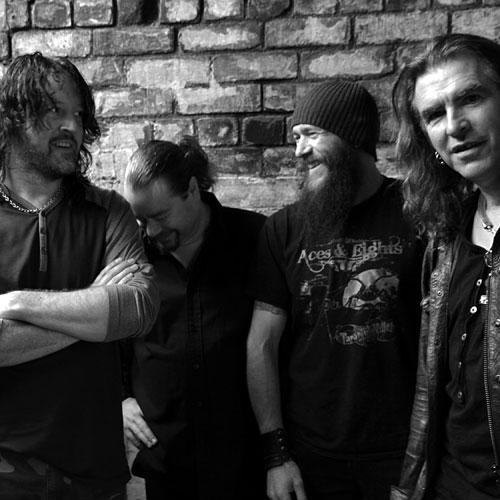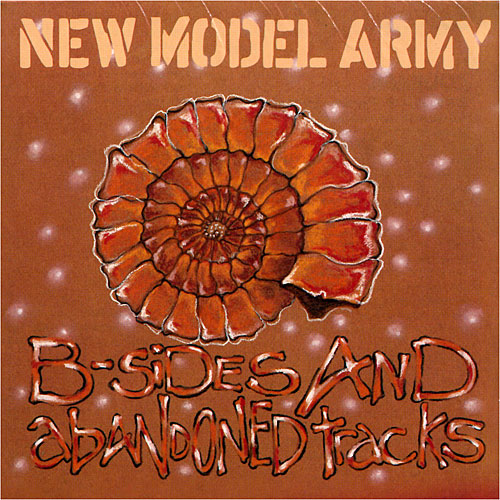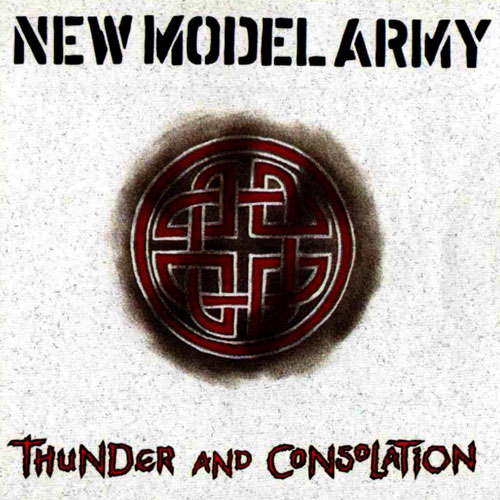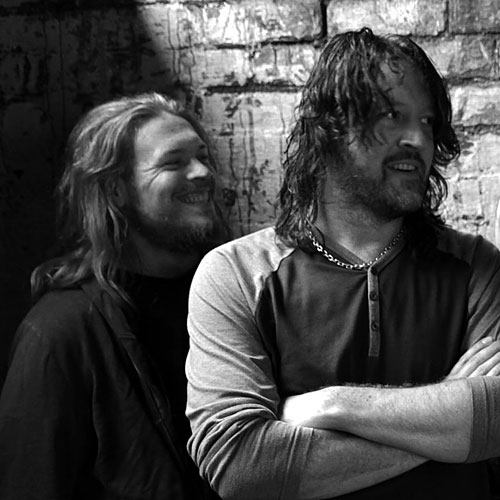New Model Army Marches On…
In mid-1991, “Raw Melody Men”, a live album from the tour, was put together and released. It was to be NMA’s last album for EMI. Unusually, given the history of the music business, the relationship between band and record company had always remained cordial but had now simply grown stale. There were minor dissatisfactions on both sides and, after lengthy negotiations, it was agreed to simply terminate the contract. NMA’s own Management Company also imploded at this time and new management was drawn up. The band was not short of new record company offers and eventually chose Epic, for reasons to do with support in the US.
Although Mrs Thatcher had been ousted by her own Party in 1990 (a memorable night coinciding with NMA’s first visit to Rome), the Conservative monolith that had ruled the country for so long remained in power and, against all expectations, won a further election in 1992. Outside Britain though, much was changed: there was recession and instability and a so-called “New World Order” in the wake of the collapse of Soviet Communism and the 1st Gulf War. Already the band was embarked upon a very dark album, driven equally by personal traumas, including Justin’s near-death electrocution on stage in Switzerland and the changes in the world around them. Produced by Niko Bolas and mixed by Bob Clearmountain, “The Love Of Hopeless Causes” was not what anyone was expecting. Just as folk-rock, pioneered and inspired in part by NMA, became a fashionable and commercial sound, the band made a deliberate move away from it and straight and into guitar-driven rock music.
Replacing Adrian with Dave Blomberg on guitar, they embarked on the album tour and the European section featured their most successful concerts yet. However NMA’s relationship with their new record company quickly deteriorated. Worse still, they found themselves caught in corporate dispute between London and New York, which was in no way related to them. By June, the band found themselves on an exhaustive US tour, in which they had invested much of their own money, with no support of any kind from Epic or any other source. The tour featured many outstanding concerts but it was a bittersweet experience. By the end of the summer, it had been agreed that there should be a year off for everyone to rest and consider the future, while the contract with Epic was quickly terminated.
Justin used 1993-4 to produce other artists (a second collaboration with Joolz entitled “Weird Sister”, Rev Hammer’s “Bishop Of Buffalo” album and also the unusual Berlin combo, The Inchtabokatables), tour with Red Sky Coven and create another way of performing NMA songs - in a duo with new guitarist Dave Blomberg. Together they went back to Justin’s first love - small club touring - and eventually released an album of the live show entitled “Big Guitars in Little Europe”, an album, which has proved enduringly popular. Robert’s main wish was to spend more time at home with his family, which he was now able to do and Nelson formed a new band “Nelson’s Column” which toured England. Ed Alleyne Johnson followed up his first solo album “The Purple Electric Violin Concerto” which had been so successful with a second entitled “Ultraviolet”.
After the year was up, Justin and Robert tentatively began work on a new project and in December 1994, the band (with Dean White on keyboards replacing Ed Alleyne Johnson) reassembled to play a short series of concerts. However, the next two years were lost while Justin and Robert, plagued by ill health and personal-life distractions tried unsuccessfully to pin down hundreds of new musical ideas into an album. It became increasingly obvious to both of them (and everyone else in and around the band) that they were now on very different musical paths. In 1997, Tommy Tee who had been the band’s Tour Manager in the 1980s returned to take control of the band’s drifting affairs. He enlisted producer Simon Dawson to help finish the project and by the autumn “Strange Brotherhood” was completed. Unsurprisingly, it’s an album full to the brim with different and contrasting musical ideas while the lyrics range from the politics of the British Road Protest movement (in which Sullivan had been actively involved during 1996) to the deeply personal and sometimes unusually obscure. During the mixing, it was agreed that Justin and Robert would go their separate ways after the tour.
Then, suddenly Robert was diagnosed as having a brain tumour, and though the operation to remove it was successful, any prospect of touring was impossible. So he suggested that his place be taken by Michael Dean, a young drummer who had been working as his technician since 1993. Having watched Robert for some years, Michael was immediately comfortable with the role of drummer and with all other aspects of the band. The “Strange Brotherhood” tour began in the spring of 1998 and, happy to be back on the road at last, for the first couple of months, the band embarked on an ambitious programme of doing two sets each night, a 50 minute acoustic set followed by a full 90 minute rock. The tour continued on and off through to the end of the year.
By now Justin and Tommy Tee had restructured New Model Army’s set-up to take account of the changes that the Internet was bringing to the whole music industry. This included making sure that the band owned every aspect of their work, and included their own record label (Attack Attack) to be distributed by different companies in different territories. 1999 began with a review of live shows recorded the previous year and their amalgamation into a live double album entitled “New Model Army and Nobody Else”. After this Justin (assisted by Michael) began to write new songs for the next album. This was done quickly and easily for the first time since “Thunder”, with Justin claiming to be “reborn as a song-writer.” To keep up the momentum, it was decided to self-produce and to record the album in the band’s own studio. Again this was done quickly with mostly Justin, Michael and Dean at the controls. (Living 250 and 300 miles from Bradford meant that Nelson and Dave were more occasional contributors for purely geographical reasons). The whole process was very much a reaction to the slow progress of “Strange Brotherhood”, with the album given the simple name “Eight” to go with its whole stripped-down approach. It was released in the Spring of 2000 and was followed by more touring.
On October 23rd 2000, the band celebrated their 20th anniversary by playing another two set marathon at Rock City in Nottingham and then three months later, further special concerts in London and Koln which featured four completely different sets spread over two nights - a 57 song marathon in each city attended by over 7000 people.
One of the legacies of the lost years of the mid 1990s was a lot of unfinished material and next, Justin, Michael and Dean worked to finish and assemble this into accessible form, a double album “Lost Songs” released in 2002. Another ‘unfinished’ project was Justin’s long promised solo album and it was at this moment that he decided to pursue it. Meant to take just a few weeks to record and tour, “Navigating By The Stars” became another marathon. Hooking up with film and TV music producer, Ty Unwin, the first week of working coincided with ‘9/11′. Rather than making a political or angry response to unfolding events, the album’s purpose was to ‘make something beautiful in an increasingly ugly World’. The album came out in 2003 to surprised and favourable reaction. At first touring alone with Dean (including a long awaited return to America), Justin was then joined by Michael playing percussion and the threesome bought a large mobile home and set off across Europe. The live album “Tales of the Road”, released in 2004 captures their unique sound and stripped-down rearrangements of some of NMA’s lesser known songs.
In 2004, an exhibition of all Joolz’ artwork for the band plus collected memorabilia was assembled for a touring exhibition. Entitled ‘One Family, One Tribe’ it has been on display in art galleries in Otley, York, Bradford and Hamm in Germany and there are plans for more future showings. Meanwhile, the band work began work on a new NMA album, at first focused around Michael’s increasing creativity as a drummer. “Carnival” was recorded with producer Chris Tsangerides and mixed by Nat Chan. It’s lyrical subjects and musical roots were as usual very eclectic but included many people’s favourite NMA track, “Fireworks Night”, Justin’s emotional response to the sudden and unexpected death of Robert that Autumn. “Carnival” was released in September 2005, but when it came to the tour, Dave Blomberg was unable to participate for family reasons and his place was taken by Marshall Gill, a blues guitarist from Ashton Under Lyne, completing the band’s current line-up in what Sullivan calls “the best version of NMA since 1985”.
The Carnival Tour marked another dynamic new beginning for the band, with Nelson sometimes playing as a second drummer, Dean sometimes as third guitarist and Michael and Marshall’s energy much in evidence. Such was the sense of momentum and togetherness that for the first time in years, NMA moved quickly on to making another album with major contributions from all members. “High” was written and recorded in five months at the beginning of 2007, produced by old friend (and another production star, Chris Kimsey) and was ‘angrier’ than any releases for a while and lyrically very much in tune with current realities.
The “High” tour rolled through 4 continents with the new line up now firmly in tune with itself and Marshall bringing a tougher edge to the band’s sound - even managing to re-arrange the classic violin led anthem “Vagabonds” into a guitar led version. This and 16 other songs were released on a new live album, “Fuck Texas, Sing For Us”, in November 2008 (the title taken from a chant at the band’s New Orleans show that serves as the intro to the album).
The year ended with tours in Scandinavia, Eastern Europe and the customary December run of London, Paris, Amsterdam, and Koln with the band playing a fiery set of recent material. Remarkably, the band’s main 17 song set featured only two pre-2000 songs, as well as brand new material, a sure sign of the band’s forward momentum - and with their ticket sales up everywhere. Then, at Christmas, manager Tommy Tee died suddenly and unexpectedly. This was a major shock to everyone in and around the band, not only because as he ran all aspects of the band’s affairs but also as a major part of the NMA family and history since 1982.
It took a while before the band could refocus but by Spring 2009, they were back in the studio working on their eleventh studio album, “Today Is A Good Day”. Mostly written in the wake of the 2008 Wall Street Collapse (an event celebrated in the white-hot opening title track), it was recorded in the band’s own studio in Bradford with Chris Kimsey once more at the controls. Chris wrote “the NMA ‘family business’ is back in full swing. The boys sound brave & united.” The album was hailed as one of their very best and the album tour began with a month in North America and went on for a further six months ending with a triumphant return to Glastonbury and other Festivals in the summer.
In the Autumn of 2010, the band celebrated their 30th Anniversary with the release of boxsets, books, DVDs and a full set of retrospective material and set out on the curious and challenging schedule. Promising to play a minimum of four songs from each of their 13 albums (including the two B-sides compilations) over two nights, they performed this marathon in different cities on four continents every weekend from September until Christmas. The final weekend in London was recorded and released in full as a five hour DVD.
After such a hectic year, the following months were always going to be relatively quiet, with just a few shows, rather more of the semi-acoustic Justin and Dean duo concerts and a handful of Festivals while the band began thinking about their next project. Consciously looking for something new after two convincing great rock band recorded live in a studio albums, this is a work in progress. However in recent months, the project has been much disrupted. Firstly Nelson decided to finally leave the band for personal family reasons after 22 years of service. This was entirely amicable on both sides and was only revealed some months after everyone in the band knew. Then, days after Nelson’s final gig in Amsterdam, a fire started in the furniture outlet next door to the the band’s Bradford base and destroyed their whole studio set-up. No one was injured and the band were even able to salvage some of their touring gear from inside charred flight-cases, but a huge amount of equipment and archive material was destroyed. Rebuilding was quick and within three months the studio was up and running with the band busy working through auditions for a new bassist. After a long process, they chose Ceri Monger, a young multi-instrumentalist from a musical family in Essex. Then, misfortune struck again after Ceri’s first gig with the band, with the theft of most of the band’s guitars and other items from a van. Despite this (and with generous help from friends and other bands) the band got through a busy Festival season and finally began work on the long-promised and much-awaited new album.
Promising something ‘very different’ from the last few ‘band-in-a-room’ albums, the band have just finished creating a rich, musical, multi-layered work with a strong overall atmosphere. In February it was mixed in his Los Angeles studio by Joe Barresi, best known for work with Tool, Queens Of The Stoneage, Bad Religion and Soundgarden - another in the long list of A-listers eager to work with the band. This album will be released later in the year. Meanwhile, BBC/Channel Four director, Matt Reid, has been putting together a documentary film about the group and trying to keep pace with all the events and changes that have happened during the filming process. A planned cinematic release will co-incide with the release of the album.
“New Model Army is a remarkable band - as hungry and focused as ever, with a continually regenerating audience and insatiable creative ambition…”
|
|

|
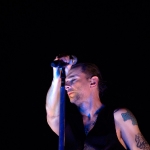
Depeche Mode |
LATEST GALLERY IMAGES
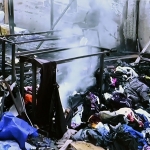
Crime Scenes 
Good Neighbours |
|
Advertising
|
|


